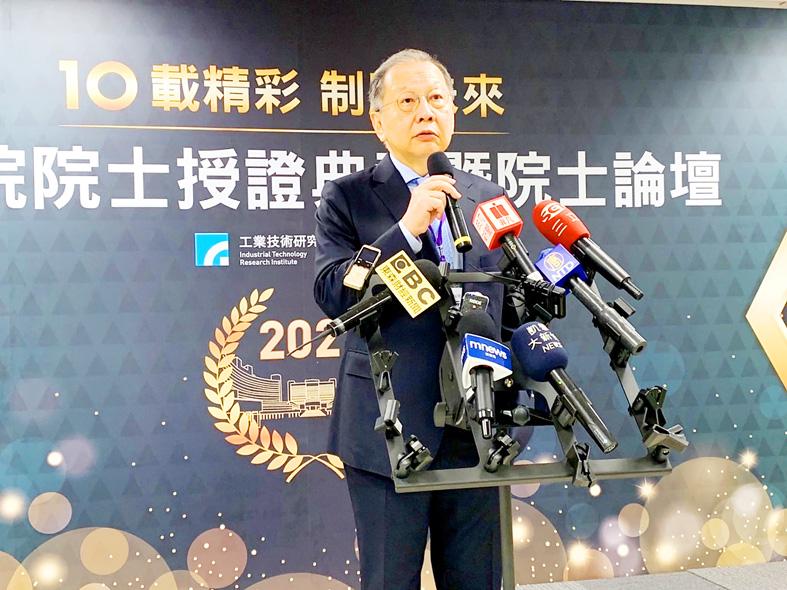MediaTek Inc (聯發科) yesterday said it would adopt next-generation 3-nanometer technology developed by Taiwan Semiconductor Manufacturing Co (TSMC, 台積電) for its new chips in a bid to consolidate its competitive edge.
The Hsinchu-based chip designer’s remarks came after speculation that Apple Inc might stick to 5-nanometer, rather than adopting TSMC’s 3-nanometer technology for its new iPhone series next year, due to unknown production problems.
TSMC has said that it is on track to increase production of 3-nanometer chips in the second half of next year.

Photo: Vanessa Cho, Taipei Times
MediaTek’s strategy is to enhance its competitiveness by collaborating with its major foundry partner, TSMC, a company executive said.
“We are not going to veer in a different direction... It is something we must do [to hold off the] competition,” MediaTek vice chairman and chief executive officer Rick Tsai (蔡力行) told a media briefing in Taipei.
“We have tapped 5-nanometer and 4-nanometer technologies to make our products. We think that 3-nanometer will certainly be next. We are working closely with TSMC,” Tsai said, declining to disclose a timeline.
MediaTek would further their cooperation by shifting to TSMC’s advanced chip packaging technology, dubbed chiplet, from existing 3D chip packaging technology.
Commenting on the lingering global chip shortage, Tsai said that supply next year would remain tight.
Tsai said that he does not expect to gain a clear picture of the supply-demand dynamics until 2023, when the world’s major foundries significantly ramp up new production.
For MediaTek, chip scarcity has been “manageable, but for the industry as a whole, it is a grave issue,” he said.
MediaTek last month told investors that it had a sufficient supply of chips to meet its business needs next year.
Given the company’s strong growth in 5G chips, Tsai said that MediaTek would be interested in using chips made at TSMC’s planned Kaohsiung factory.
TSMC’s board of directors approved the capacity expansion plan last week.
“The 5G market is growing beyond China next year, which will create a good opportunity for the company,” Tsai said.
MediaTek said that it expects to capture more than 35 percent of the Android-based smartphone market in North America.
The global 5G penetration rate next year is expected to exceed 50 percent, up from 30 percent this year, MediaTek added.

Nvidia Corp chief executive officer Jensen Huang (黃仁勳) on Monday introduced the company’s latest supercomputer platform, featuring six new chips made by Taiwan Semiconductor Manufacturing Co (TSMC, 台積電), saying that it is now “in full production.” “If Vera Rubin is going to be in time for this year, it must be in production by now, and so, today I can tell you that Vera Rubin is in full production,” Huang said during his keynote speech at CES in Las Vegas. The rollout of six concurrent chips for Vera Rubin — the company’s next-generation artificial intelligence (AI) computing platform — marks a strategic

Enhanced tax credits that have helped reduce the cost of health insurance for the vast majority of US Affordable Care Act enrollees expired on Jan.1, cementing higher health costs for millions of Americans at the start of the new year. Democrats forced a 43-day US government shutdown over the issue. Moderate Republicans called for a solution to save their political aspirations this year. US President Donald Trump floated a way out, only to back off after conservative backlash. In the end, no one’s efforts were enough to save the subsidies before their expiration date. A US House of Representatives vote

Shares in Taiwan closed at a new high yesterday, the first trading day of the new year, as contract chipmaker Taiwan Semiconductor Manufacturing Co (TSMC, 台積電) continued to break records amid an artificial intelligence (AI) boom, dealers said. The TAIEX closed up 386.21 points, or 1.33 percent, at 29,349.81, with turnover totaling NT$648.844 billion (US$20.65 billion). “Judging from a stronger Taiwan dollar against the US dollar, I think foreign institutional investors returned from the holidays and brought funds into the local market,” Concord Securities Co (康和證券) analyst Kerry Huang (黃志祺) said. “Foreign investors just rebuilt their positions with TSMC as their top target,

REVENUE PERFORMANCE: Cloud and network products, and electronic components saw strong increases, while smart consumer electronics and computing products fell Hon Hai Precision Industry Co (鴻海精密) yesterday posted 26.51 percent quarterly growth in revenue for last quarter to NT$2.6 trillion (US$82.44 billion), the strongest on record for the period and above expectations, but the company forecast a slight revenue dip this quarter due to seasonal factors. On an annual basis, revenue last quarter grew 22.07 percent, the company said. Analysts on average estimated about NT$2.4 trillion increase. Hon Hai, which assembles servers for Nvidia Corp and iPhones for Apple Inc, is expanding its capacity in the US, adding artificial intelligence (AI) server production in Wisconsin and Texas, where it operates established campuses. This